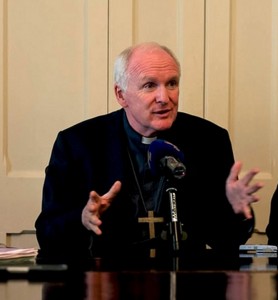
By Susan Gately - 17 June, 2018

Bishop Brendan Leahy
Pope Francis is famously quoted as saying said that “today we are not living in an era of changes but rather in a change of era”. Citing the Pope, the Bishop of Limerick said today’s new era required “new things”.
Addressing the topic “From a Church of Sacraments to the Church as Sacrament”, Bishop Leahy admitted “We are seeing a decline of Church. But it’s not that the Church itself is dying. Rather, a certain social shape or configuration of Church is passing, giving way, in God’s time, to a new shape of things.”
At the 1989 International Eucharistic Congress, the Cardinal of Seoul, Cardinal Stephen Kim, invited all there to be “like one great host in society”. And again during the 1991 Synod on Europe, one of the speakers said “The only Bible people read is us.”
“These two phrases tell us something of the epochal shift that is happening in the Church. It’s the Body of Christ that is the sacrament that we need to focus on in a new way,” Bishop Leahy told priests from five Christian denominations gathered at the Focolare Centre in Prosperous for the annual meeting of clergy.
In instituting the sacraments, Jesus did not intend them as an end in themselves, said Bishop Leahy. “They are with a view to building us up so that we become the body of Christ, we become the sacrament of Christ in our world. Our community life is itself to become his continuing presence in the world.”
What we are talking about, continued the Bishop of Limerick, is a movement from seeing the Church where the sacramental life of priests, liturgies and sacraments are central, to seeing things through the lens of the ecclesiology of communion and the People of God that Vatican II underlined, a Church that in and through the communion of love and faith lived out day by day as a community, is full of God and generates him in the world. In other words, where all are active agents of the Church. “Lay people aren’t just the objects of our care but themselves active, co-responsible, agents of the Church,” he emphasised.
Quoting Pope Francis, he said the implications for priests were that they had to be attentive to the supernatural “sense” of the People of God, walk among the flock – not ahead of them – and experience a “pastoral conversion”. This conversion requires “rather than focusing on getting people into church” bringing “what the Church gives us to live out, into the world around us. The Church as the sacrament of the world.”
We are to be a Trinitarian leaven in society because society is made for this life of the Trinity, he added. This would shape the way priests approach pastoral ministry, for example “nourishment/nurturing moments at the beginning of each pastoral council meeting; focus on bible groups”. Team ministry “requires we share life and not just ideas. We share weaknesses and limits and face challenges together.”
It is a pastoral conversion that is also personal, said the Bishop of Limerick. “Certainly we preach, we administer sacraments, but we need to share what we are living of God – to be witnesses who generate life, bringing Christ to birth in people and among people, being mothers and fathers of people.”
Among those present at the Building up the Church as Family meeting were clergy from the Ethiopian Orthodox, Presbyterian, Church of Ireland, Lutheran and Catholic Churches.